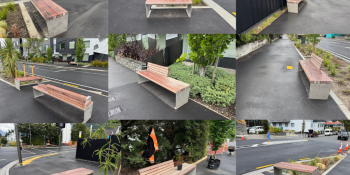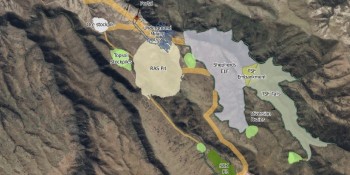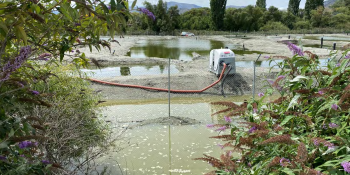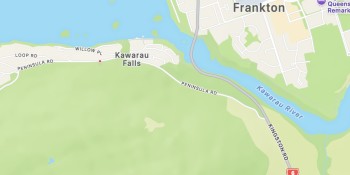Wānaka teens take part in world-first science course
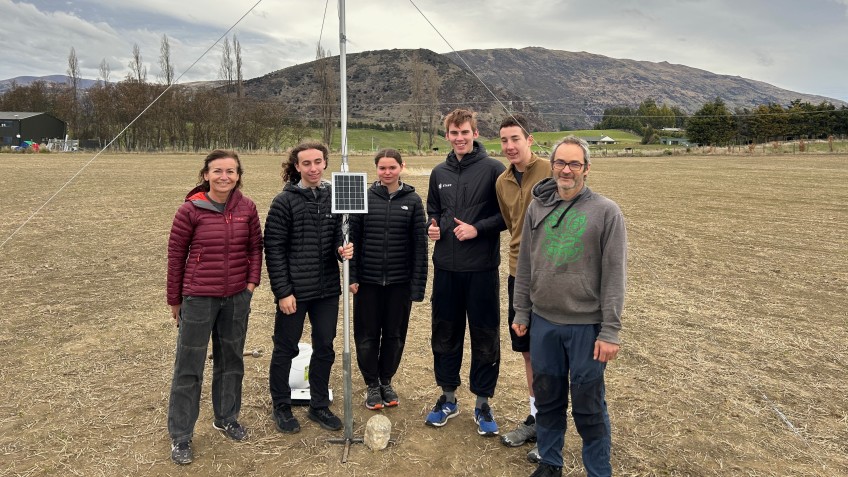
A group of Te Kura o Tititea Mount Aspiring College Year 13 students is undertaking a world-first, university-level science course combining physics, electronics and computer skills.
Amy Benson, Anton Jones, Josh Moody, and Baxter Pollard are researching how GPS signals can be used to monitor properties of the earth’s environment.
This is the first time the Geoscience and Remote Sensing Society (GRSS) - one of the 39 societies of the global Institute of Electrical and Electronics Engineers (IEEE) - has sponsored a course for high school students.
Chair of the New Zealand chapter of the GRSS Dr Delwyn Moller says the course meets the needs of students who have completed Year 13 physics in Year 12 and are interested in taking university-level coursework during their final year at school.
“We worked with MAC teachers Euan Simpson (physics) and Craig Jefferies (technology) to craft a proposal to the IEEE GRSS to sponsor this new course,” Dr Moller says.
“The GRSS was immediately supportive of the concept and is watching the outcomes of the course with interest.
“The course involves creating ground validation sites for the world’s scientists so they can use it to monitor GPS-reflected signals to better understand our environment. We hope it will serve as a prototype for students worldwide.”
Baxter, one of the students involved, says the course provides challenges that are bigger than any other problems he had worked on throughout his education.
“This project involves physics, coding, electronics, mechanical design, and implementation, and has shown us how reflected GPS signals can be used to measure lake height, soil moisture, and snow height.
“Through this course, I have learned very good debugging skills because not everything has worked as designed, and this has been a great lesson to me.”
Fellow student Josh says it has been exciting to undertake a project with real-world relevance and to approach a new and unfamiliar topic through the perspective of an engineer.
“I have really enjoyed the hands-on, practical aspect of the project. We’ve been able to ‘let loose’ and figure out the best way to solve the problem by trial and error rather than simply being told what to do.”
The project has drawn support from Snow Farm NZ, which agreed to host a GPS station.
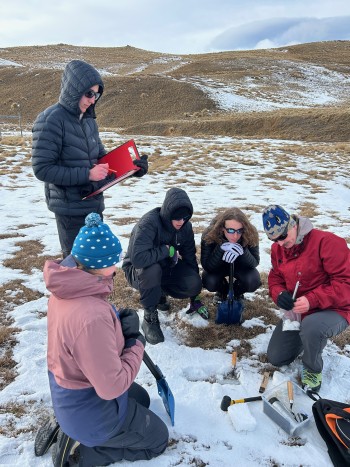
Left to right, pupils Amy Benson, Josh Moody, Anton Jones, Baxter Pollard, and Prof Wolfgang Rack Director of Gateway Antarctica University of Canterbury (Image: Supplied).
“We are excited to be a part of this ground-breaking project. The students have built a low-cost GPS receiver and deployed it at the top of the Pisa range,” Snow Farm general manager Sam Lee says.
“Our business relies on annual snowfall to run, and a solution such as this could be a vital part of understanding the impact of the climate on the future of Snow Farm.”
Also involved in the project is ReSTORe Lab, a Wānaka-based company that focuses on the development of new, advanced remote sensing methods for monitoring the earth. Company chief executive Dr Delwyn Moller and chief technology officer Dr Brian Pollard are mentoring the MAC students and delivering course content.
ReSTORe Lab also leads the Rongowai project, a collaboration with NASA and Air New Zealand to use GPS receivers to monitor environmental properties from an Air New Zealand aircraft – the same technology being used by the students – with both projects aiming to advance earth observations.
The four MAC students attended the New Zealand Aerospace Summit in Christchurch last month to present their findings as part of the University of Canterbury exhibit at the event.
Following completion of this year’s pilot, MAC will continue to offer the course, with the aim of expanding the project to include multiple GPS sites at Snow Farm and elsewhere in the region.
MAC says it is grateful to the visiting lecturers who have volunteered their time during the course: Associate Professor Robert Odolinski from the School of Surveying at the University of Otago, Professor Wolfgang Rack, the Director of Gateway Antarctica at the University of Canterbury, and Associate Professor Nicholas Rattenbur from the Department of Physics at the University of Auckland.
Main image (Supplied): Left to right, Dr Delwyn Moller, students Baxter Pollard, Amy Benson, Anton Jones, Josh Moody, and technology teacher Craig Jefferies.










